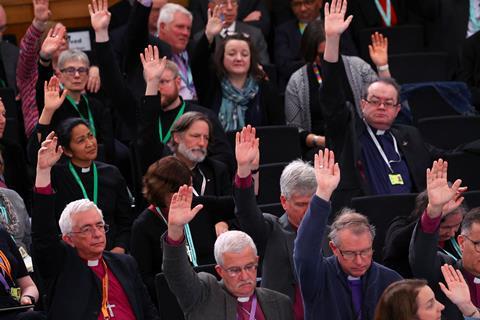Yet there were some glimmers of hope, says Rev Jago Wynne. Here’s what a way forward for the CofE might look like

I was watching the Graham Norton Show a couple of weeks ago. In his opening monologue to camera, Norton spoke of a Sat Nav glitch which keeps directing drivers down a set of stone steps into a town’s local park. As he spoke, images appeared of cars, vans and even lorries that had followed the Sat Nav and ended up stuck on these stone steps as they attempted to reach their destination.
That feels an all-too-accurate picture of the Living in Love and Faith process. As the Church of England General Synod continue to debate same-sex relationships and sexual practice, I have lost count of the number of times I have heard people say: “We just need to get on with implementing the decisions that have already been made”, or: “We’ve voted for it – let’s not delay”.
Yet there has been little forward movement. It feels like Synod has voted to turn but, again and again, we’ve found ourselves stuck on the stone steps, unable to move.
Stuck on the steps
I think this ‘stuck-ness’ has two causes:
First, a failure to recognise that voting for something in Synod doesn’t change the reality of reality.
Take an amendment proposed by Ed Shaw in the most recent discussions. He proposed to insert an acknowledgement that “for many in the Church of England, including members of General Synod, some of the issues raised [about matters of sexual practice and the Prayers of Love and Faith] are not matters on which they can simply agree to disagree”. Ed’s amendment wasn’t adopted, but 47 per cent of clergy and laity voted for it, which rather proved the point.
53 per cent may have opposed it, but it is still a true statement. There are people – all 47 per cent of us - who can’t just agree to disagree.
The speeches and votes illustrated the CofE’s continuing deep and painful divisions
It’s the same idea amongt the Bishops. The papers in advance of General Synod told us that the Bishops had previously voted to determine that same-sex marriage is distinct from Holy Matrimony (20 votes to 15 – Annex B of GS 2346). This vote took place to provide a rationale for the possibility of clergy being permitted to be in same-sex marriages without claiming to be altering the doctrine of marriage.
But the fact that the Bishops voted on it doesn’t change the reality. Both the legal and theological advice that the Bishops received before their vote told them something very different. Twenty of them just chose to ignore this.
Second, a failure to recognise that voting for something in Synod doesn’t change the reality of our constitution.
Take the introduction of stand-alone services of blessing for same-sex couples, which was given the possibility of going ahead by just one vote in November’s Synod. In the run up to this week’s Synod, we were told in Annex A of the papers that there is considerable risk of legal challenge to implementing these services, other than by using Canon B2, which requires two thirds of Synod to approve it. In other words, all the other routes are probably unlawful, but we haven’t got close to the required level of approval for the one clearly lawful route, according to the General Synod’s own constitution.
And so - as a whole Church – the CofE seem well and truly stuck on the steps. Our wheels are spinning, we’re revving our engines - sometimes far too loudly - unable to move in any direction.
Finding fresh direction
However, there were glimmers of hope. First, the new lead bishop, Rt Rev Martyn Snow, Bishop of Leicester, asked for a reset in tone, transparency and trust. While the trust of the Bishops still needs to be rebuilt, the tone and transparency were markedly improved, not least due to Bishop Martyn’s own example. He proved an excellent chair and, with his leadership, there seems more possibility of finding a way forward.
47 per cent of us can’t just agree to disagree
Second, the new road ahead. The amendments moved, and the speeches and votes that followed, illustrated the CofE’s continuing deep and painful divisions. However, no overall vote was taken, as both those wanting change and those seeking to remain with the received teaching were unhappy with elements of what was being proposed.
Instead, there was a procedural motion to “Move to Next Business” which was highly supported (322 in favour, 69 against and 20 recorded abstentions). This decision now allows for greater imagination and inventiveness as we try and chart a way forwards that both groupings might be happy with. There is no denying that we are currently stuck on the stone stairs, but there is now a window before July’s General Synod where there is the possibility of proposing a new road that all might feel able to drive down.
We need a set of commitments, together with a settlement based on legally secure structural provision. If Bishop Martyn can lead us in building this new road together, we may have a new structure that allows us all to move forwards.
As Graham Norton would suggest - let’s start the show!



































4 Readers' comments